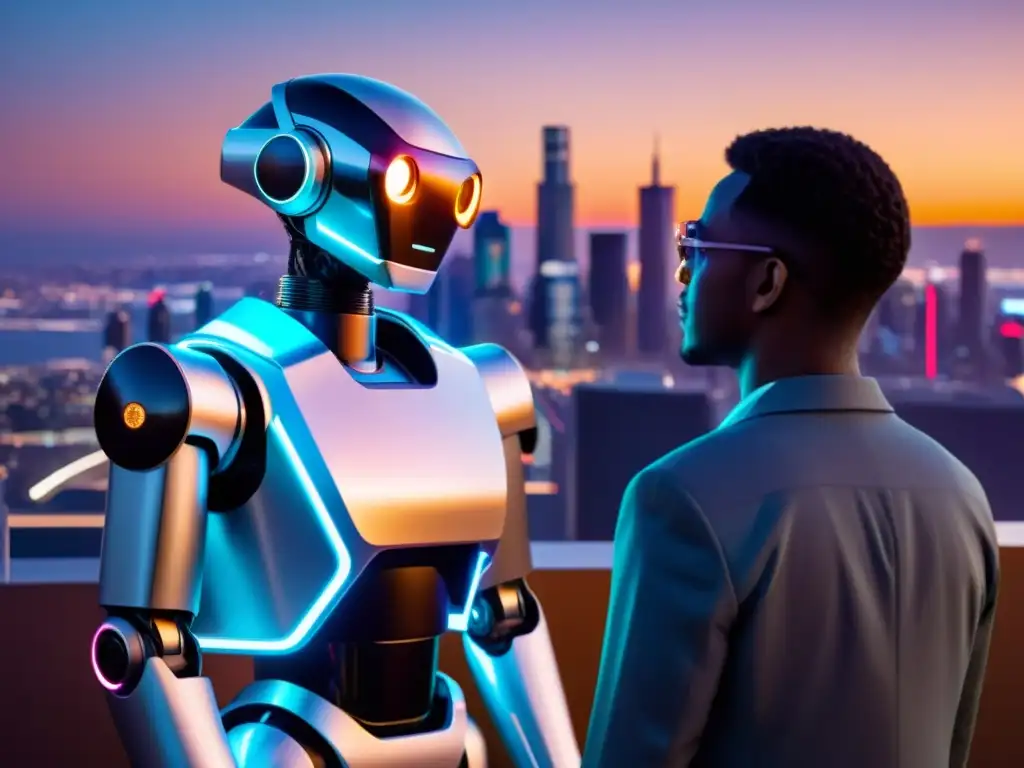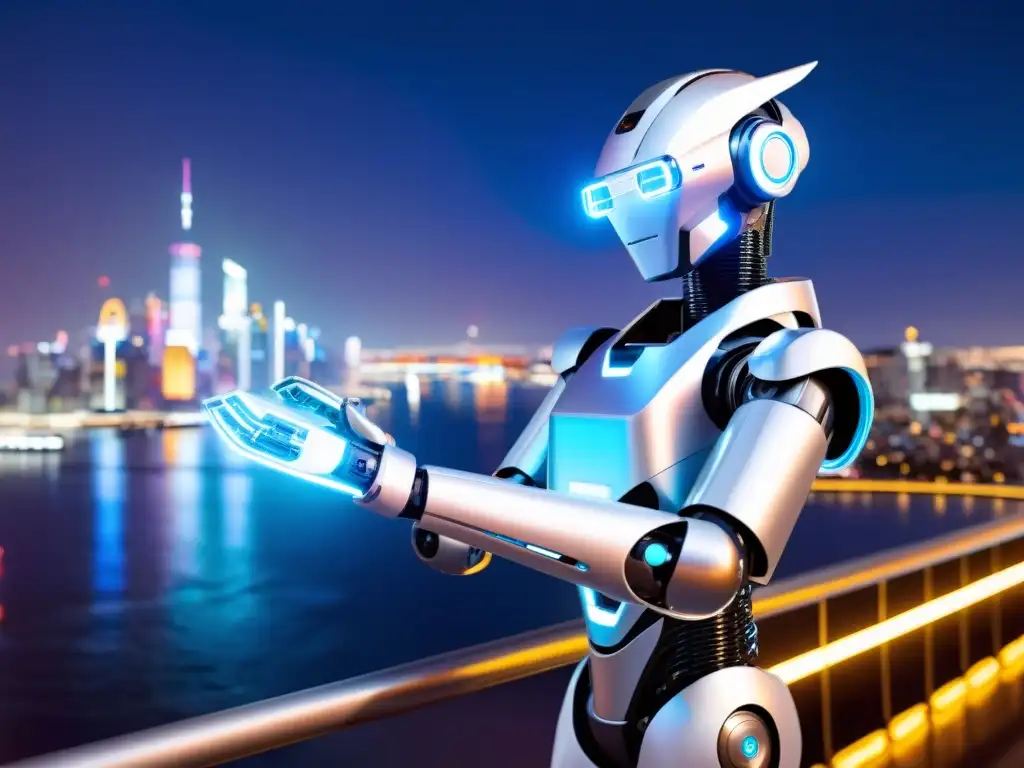AI and the Future of Personal Relationships: Can We Trust the Technology?

Today, Artificial Intelligence (AI) is transforming the way we interact, both personally and socially. This technological advancement has generated a series of significant impacts, as well as ethical and social challenges that must be critically addressed. One of the fundamental aspects of this transformation is the role of trust in AI technology, which plays a crucial role in the acceptance and adoption of these innovations.
The impact of AI on personal relationships
AI has significantly impacted personal relationships, facilitating communication through intelligent messaging systems, virtual assistants, and social media platforms. These technologies enable more efficient and personalized interactions, providing the ability to maintainain connections with friends and family anywhere in the world. Furthermore, AI has made inroads into the field of online dating, where matching algorithms seek to create compatible partners through data analysis and behavioral patterns.
On the other hand, AI has also posed challenges in personal relationships, as over-reliance on digital communication could affect the quality of face-to-face interactions. The balance between the convenience provided by technology and authentic human connection has become a topic of debate in the age of AI.
AI has transformed the way people interact, offering both opportunities and challenges in the realm of personal relationships.
Advances in AI pose ethical and social challenges in the context of personal relationships. The massive collection of personal data to personalize interactions and recommendations raises concerns about privacy and information manipulation. Likewise, AI's ability to convincingly simulate human conversations raises ethical questions about transparency in communication and the responsible use of this technology in personal relationships.
Furthermore, AI can also introduce bias into interactions, whether through recommendation algorithms that reinforce stereotypes or through automated decisions that may lack human empathy and understanding. These ethical and social challenges require in-depth analysis and the implementation of regulatory measures to ensure that AI is used ethically and responsibly in personal relationships.
The role of trust in AI technology
Trust plays a critical role in the adoption and acceptance of AI technology in the context of personal relationships. Users must trust that their personal data will be treated securely and that interactions with AI systems will be trustworthy and respectful. Transparency in the operation of algorithms, as well as in the collection and use of data, is essential to building and maintaining trust in AI.
Furthermore, trust in AI technology is also related to its ability to understand and adapt to individual needs and preferences, without compromising user privacy or security. Implementing ethical standards and user-centered design practices is crucial to fostering trust in AI technology in the context of personal relationships.
Trust plays a central role in how AI impacts and integrates into personal relationships, and its importance lies in building a safe, ethical, and respectful environment in which technology and humanity can coexist harmoniously.
The evolution of Artificial Intelligence

Artificial Intelligence (AI) has experienced remarkable progress from its theoretical beginnings in the 1950s to its practical application today. Initially, AI focused on problem-solving and machine learning, but as processing capacity and data volume have increased exponentially, AI has evolved into fields such as natural language processing, computer vision, and autonomous decision-making.
The development of AI algorithms capable of learning autonomously, adapting to new situations, and making complex decisions has revolutionized numerous industries, from medicine to logistics, and has given rise to a new era of technology.
AI has evolved from a theoretical concept to a ubiquitous tool in everyday life, raising fundamental questions about its role in human interactions and the trust we can place in it.
Current applications of AI in personal relationships
Today, AI already plays a significant role in personal relationships across a variety of applications. Virtual assistants such as Siri, Alexa, and Google Assistant use AI algorithms to understand and respond to user queries, allowing them to interact more naturally with technology. Furthermore, recommendation algorithms on streaming platforms and social media use AI to personalize and optimize the user experience, influencing social interactions and content consumption.
In the realm of romantic relationships, dating apps like Tinder and Bumble use AI algorithms to analyze profile and behavioral data to connect people with similar interests and characteristics. While these apps have transformed the way people meet, they also raise questions about privacy and the ethics of using personal data.
Furthermore, AI has been introduced into therapy and emotional well-being through chatbots and mental health apps that offer personalized support and guidance. These apps have opened up new possibilities for access to medical care and emotional support, but they pose challenges in terms of confidentiality and the quality of care provided.
Future of AI in human interactions
As AI continues to develop, its influence on human interactions will continue to expand. AI is expected to play an increasingly important role in healthcare, personalized education, financial advice, and other aspects of everyday life. However, the widespread use of AI raises complex ethical and social questions, including trust in algorithmic autonomous decision-making and the impact on privacy and the authenticity of human interactions.
In the realm of personal relationships, AI could influence how people meet, interact, and maintain emotional bonds. From detecting emotions in language and recognizing gestures to personalizing recommendations and facilitating communication, AI has the potential to transform interpersonal dynamics in both positive and challenging ways.
It's crucial to address these issues as AI becomes more deeply embedded in our lives, and to maintain a balance between convenience and trust in the technology. As we explore the possibilities and challenges of AI in personal relationships, it's critical to consider how we can use this technology ethically and responsibly, preserving authenticity and trust in our human interactions.
Varieties of AI and their influence on trust
Artificial intelligence (AI) encompasses a variety of technologies, from recommendation systems to voice assistants and autonomous robots. Each of these AI varieties has a significant impact on the trust users place in the technology. For example, recommendation systems used in music and video streaming platforms can influence users' decisions and preferences, which can generate trust or skepticism depending on how accurately they adapt to individual tastes.
Likewise, voice assistants such as Siri, Alexa, and Google Assistant represent a form of AI that interacts directly with users in everyday tasks. Trust in these assistants is closely tied to their ability to understand and execute commands accurately and safely. On the other hand, autonomous robots used in environments such as manufacturing, logistics, and healthcare pose additional trust challenges, as users must trust these systems' ability to operate safely and efficiently without direct human supervision.
The different varieties of AI have a significant impact on user trust. The accuracy, reliability, and adaptability of these technologies influence individuals' perceptions of AI's trustworthiness in their daily lives.
Challenges of trusting AI technology

Artificial Intelligence (AI) has transformed the way we interact with technology and significantly impacted our personal relationships. However, this technological advancement comes with significant challenges that must be addressed to foster trust in its application.
Privacy and security in AI applications
One of the key challenges surrounding trust in AI centers on data privacy and security. AI applications often require access to vast amounts of personal information to deliver personalized services, raising valid concerns about data misuse. It is critical that AI companies and developers establish strict security and data protection measures to ensure user privacy.
Furthermore, transparency in the use of data and algorithms is essential to building trust in AI applications. Users must understand how their data is collected, used, and protected, which requires greater clarity and disclosure from the companies developing these technologies.
Implementing robust cybersecurity standards and complying with privacy regulations, such as the European Union's General Data Protection Regulation (GDPR), are critical steps to addressing privacy and security concerns in AI applications.
Ethics and responsibility in the development of AI for personal relationships
Another crucial aspect of building trust in AI technology is the ethical consideration and responsibility in its development and application. Algorithmic decisions in personal interactions, such as partner recommendations on dating apps or emotional counseling, must be supported by sound ethical principles.
It is critical that AI developers adopt an ethical approach focused on respect, fairness, and integrity when creating algorithms that influence personal relationships. Transparency in the design and operation of these algorithms is essential so that users understand how decisions are made and what factors influence the recommendations or advice provided by the AI.
Furthermore, responsibility in AI development involves the ability to identify and mitigate potential algorithmic biases that could influence personal interactions. Implementing ethical audits and ongoing oversight are critical steps to ensure that AI is used ethically and responsibly in the context of personal relationships.
Public perception of trust in AI
Public perception plays a key role in trusting AI for personal relationships. Previous experiences, both positive and negative, shape users' perceptions of the trustworthiness of AI technology in the realm of personal relationships.
Companies and AI developers should strive to communicate clearly and educationally about the capabilities, limitations, and benefits of their applications. Educating the public about how AI works and its impact on personal relationships can contribute to a more informed and positive perception of this technology.
Furthermore, actively incorporating user feedback and opinions into the AI application development process can enhance trust by demonstrating a commitment to continuous improvement and adapting to user needs and concerns.
Benefits of trust in AI technology

Optimizing decision-making in personal relationships
One of the most promising aspects of integrating Artificial Intelligence (AI) into personal relationships is the optimization of decision-making. AI has the ability to process large amounts of data and analyze complex patterns to provide personalized recommendations. In the context of personal relationships, this could mean advice on important topics, such as conflict resolution, time management as a couple, or shared financial decision-making. By offering objective, data-driven information, AI can help people make more informed decisions and ultimately strengthen trust in their relationships.
Additionally, AI can help identify potential conflicts or challenges in personal relationships by analyzing interaction and communication patterns. This allows couples to proactively address potential issues, which in turn can strengthen trust by demonstrating a commitment to growth and constructive conflict resolution.
Optimizing decision-making through AI could ultimately foster greater transparency and understanding in relationships, helping to build and maintain mutual trust.
Improved communication and emotional understanding
Another highlight is AI's ability to improve communication and emotional understanding in personal relationships. Advances in natural language processing and emotion recognition allow AI to analyze conversations and provide insights into communication patterns, empathy levels, and emotional understanding in a relationship. This could be especially beneficial in situations where people face challenges communicating effectively or expressing their emotions. AI could identify areas for improvement, offer suggestions for more effective communication, and provide tools to strengthen emotional understanding between the parties involved.
Furthermore, AI applied to interpersonal communication could help overcome language and cultural barriers, facilitating greater understanding and connection between individuals from diverse backgrounds. By improving communication and emotional understanding, AI could lay the foundation for stronger and more meaningful relationships based on trust and empathy.
Possible advances in the resolution of interpersonal conflicts
The integration of AI into personal relationships could also lead to potential advancements in interpersonal conflict resolution. By analyzing data on past interactions, AI could identify patterns of behavior, pinpoint potential conflict triggers, and offer strategies for constructively managing and resolving disagreements. This ability to provide objective perspectives and data-driven suggestions could be invaluable in helping couples and other personal relationships overcome challenges and strengthen mutual trust through effective conflict resolution.
Furthermore, AI could offer tools for mediation and negotiation, providing an impartial, data-driven approach to addressing differences and finding mutually beneficial solutions. This could help foster a sense of fairness and justice in relationships, fundamental elements for building and maintaining long-term trust.
The integration of AI into personal relationships has the potential to optimize decision-making, improve communication and emotional understanding, and lead to potential breakthroughs in interpersonal conflict resolution. These advances could lay the foundation for stronger relationships based on trust, transparency, and mutual understanding.
The role of trust in the future of AI

Currently, one of the main challenges in the development of artificial intelligence (AI) is the creation of more trustworthy systems. Trust in AI technology is essential for its widespread adoption and integration into personal relationships, both in professional settings and in everyday life.
Developing more reliable AI systems
The development of more trustworthy AI systems is essential to ensuring widespread acceptance and adoption of this technology. Transparency in the algorithms used, ethical data processing, and the ability to explain the reasoning behind AI decisions are key aspects of building trust in this technology.
Furthermore, implementing robust security and privacy measures is critical to mitigating the risks associated with AI misuse. Creating clear standards and regulations around AI will also help increase user trust and encourage responsible development of this technology.
Developing more trustworthy AI systems requires a comprehensive approach that encompasses transparency, ethics, security, privacy, and regulation.
Impact of the mass adoption of AI technologies on personal relationships
Trust in AI technology plays a crucial role in the widespread adoption of AI applications in personal relationships. From virtual assistants to recommendation systems, confidence in the accuracy, fairness, and safety of AI will influence people's willingness to integrate these technologies into their daily lives.
For example, trust in a virtual assistant's ability to understand and accurately respond to user requests will determine its widespread acceptance. Similarly, trust in the fairness of content recommendation algorithms or professional profiles will influence people's willingness to use these tools in their everyday interactions.
In this sense, building trust in AI technology involves not only technical aspects, but also users' perceptions and experiences when interacting with these applications.
Conclusions

Trust in Artificial Intelligence (AI) is crucial for the future of personal relationships. As AI becomes increasingly integrated into our lives, from virtual assistants to recommendation systems, it is critical that users trust the technology to interact effectively with it.
Trust in AI relies on transparency and reliability. Users must understand how and why AI makes decisions, as well as be confident that the technology will operate consistently and accurately. A lack of trust in AI can hinder its adoption and limit its potential to improve personal relationships.
To foster trust in AI, it is critical that developers and technology companies be transparent about how data is collected, processed, and used. Regulations and ethical standards also play a crucial role in building user trust in AI technology by ensuring that data privacy and security are respected.
The importance of trust in AI for the future of personal relationships
Trust in AI is critical to the future of personal relationships. From personalizing online interactions to assisting with decision-making, AI has the potential to enrich and simplify our lives. However, for this to be possible, users must trust the technology and feel comfortable interacting with it.
Trust in AI is also essential for its application in fields such as healthcare and social care. AI systems that support medical decision-making, for example, must be highly reliable to ensure patient safety and overall well-being. Similarly, in the field of social care, trust in AI is critical to helping people effectively and ethically.
Trust in AI is a key enabler for the future of personal relationships, allowing technology to significantly improve people's everyday lives.
Final thoughts on the impact of trust in AI technology
Trust in AI technology is not only important for developing effective personal relationships, but also influences the overall adoption of AI in society. As AI becomes an integral part of numerous aspects of our lives, from education to entertainment, trust in this technology will be critical to its success and widespread acceptance.
Building trust in AI requires a holistic approach that encompasses transparency, reliability, and ethics in the design and implementation of AI systems. As we move toward an increasingly interconnected and automated future, trust in AI will remain a central theme in the debate about the role of technology in our lives.
Ultimately, trust in AI not only affects the effectiveness of individual interactions but also shapes the overall landscape of the technology and its impact on society. Actively addressing the need to build trust in AI is crucial to ensure this technology continues to be a positive and transformative force in the future.
Frequently Asked Questions
1. What is AI technology?
AI technology, or Artificial Intelligence , refers to the ability of machines to mimic human intelligence, performing tasks such as learning, reasoning, and decision-making.
2. In what areas is AI technology applied?
AI technology is applied in a variety of fields , including medicine, automotive, industrial, financial services, and customer service, among others.
3. What are the concerns around trust in AI technology?
Concerns include data security , privacy , algorithmic bias , and the impact on employment due to task automation.
4. How can trust in AI technology be fostered?
Trust in AI technology can be fostered through transparency in algorithms , ethics in development , and appropriate regulation .
5. What is the role of education in promoting trust in AI technology?
Education plays a crucial role in fostering digital literacy , AI awareness , and technology skills training to understand and responsibly use AI technology.
Final Reflection: Trust in AI Technology
Trust in AI technology is more relevant than ever in our current society, where human-machine interaction is becoming increasingly common and crucial.
The influence of AI on our personal relationships and society at large is undeniable. "Technology is neither good nor bad, nor neutral," as historian Melvin Kranzberg once stated, and it is our responsibility to understand and navigate its impact on our lives. "Trust is like the oxygen of life. Without it, love, friendship, and joy cannot exist" - Deepak Chopra.
It is crucial to reflect on how we can cultivate trust in AI technology, both individually and collectively. We must strike a balance between technological innovation and the preservation of fundamental human values to build a future where trust in AI technology promotes the well-being and progress of humanity.

Publicar un comentario